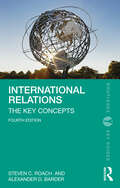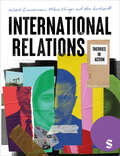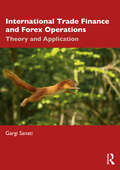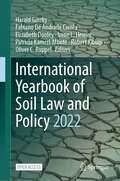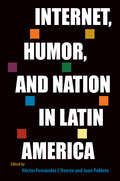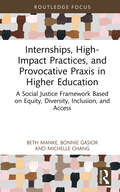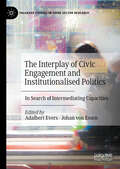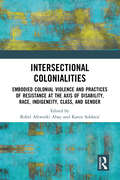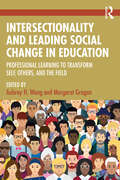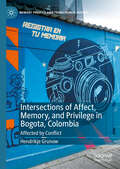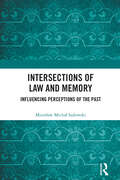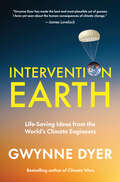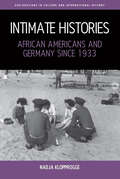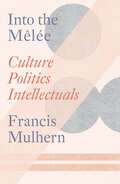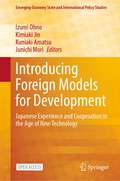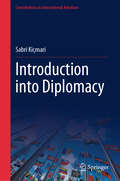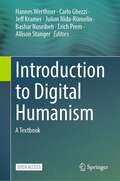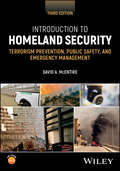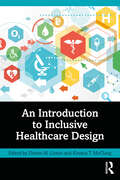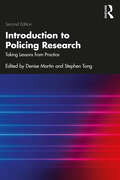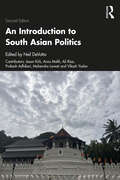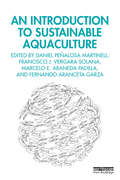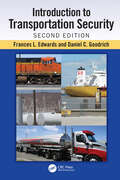- Table View
- List View
International Relations: The Key Concepts (Routledge Key Guides)
by Steven C. Roach Alexander D. BarderFeaturing 16 new entries, International Relations: The Key Concepts, now in its fourth edition, is the essential guide for anyone interested in international affairs. Comprehensive and up to date, it introduces the most important themes in international relations. New entries include the following: Anthropocene Authoritarian populism Borders Brexit Dignity Hierarchy Intersectionality Pandemic Postmodern warfare Race war Resilience Featuring suggestions for further reading as well as a unique guide to websites on international relations, this accessible guide is an invaluable aid to an understanding of this expanding field, ideal for student and non-specialist alike. It will serve as a vital reference text for undergraduate IR courses.
International Relations: Theories in Action
by Hubert Zimmermann Milena Elsinger Alex BurkhardtThe definitive applied theory textbook that helps you make sense of global issues through theoretical concepts. Not presupposing any prior knowledge, this introduction equips you with the skills to use theories as adaptable tools to tackle complex global issues. Adopting a critical and questioning approach, you will be equipped in theory as a series of tools to be used, adapted, combined, and applied when grappling with some of the most contested issues in global politics. Theoretical perspectives are brought alive as a vital tool to understand concrete historical and contemporary examples. This indispensable text starts by examining key theories spanning constructivism and postcolonialism to realism and liberalism with a real-world perspective which prioritises empirical purchase. From here, chapters take a critical, questioning approach to tackle core problems of international politics – from armed conflict and financial markets to the climate crisis, global inequality, gender and race. This text is the ideal companion for all undergraduate and postgraduate students of global affairs. Hubert Zimmermann is Professor of International Relations at Philipps University of Marburg, Germany. Milena Elsinger is Head of the student information department at Philipps University of Marburg, Germany. Alex Burkhardt teaches at the Bundessprachenamt in Koblenz, Germany and previously taught at Philipps University Marburg, Germany.
International Relations: Theories in Action
by Hubert Zimmermann Milena Elsinger Alex BurkhardtThe definitive applied theory textbook that helps you make sense of global issues through theoretical concepts. Not presupposing any prior knowledge, this introduction equips you with the skills to use theories as adaptable tools to tackle complex global issues. Adopting a critical and questioning approach, you will be equipped in theory as a series of tools to be used, adapted, combined, and applied when grappling with some of the most contested issues in global politics. Theoretical perspectives are brought alive as a vital tool to understand concrete historical and contemporary examples. This indispensable text starts by examining key theories spanning constructivism and postcolonialism to realism and liberalism with a real-world perspective which prioritises empirical purchase. From here, chapters take a critical, questioning approach to tackle core problems of international politics – from armed conflict and financial markets to the climate crisis, global inequality, gender and race. This text is the ideal companion for all undergraduate and postgraduate students of global affairs. Hubert Zimmermann is Professor of International Relations at Philipps University of Marburg, Germany. Milena Elsinger is Head of the student information department at Philipps University of Marburg, Germany. Alex Burkhardt teaches at the Bundessprachenamt in Koblenz, Germany and previously taught at Philipps University Marburg, Germany.
International Trade Finance and Forex Operations: Theory and Application
by Gargi SanatiThis book bridges the existing gap between the theory and practices related to international finance. It discusses banking theories and operational procedures relating to the methods of payment with special reference to Letters of credit (LCs), like revolving LCs, back-to-back LCs, transferable LCs, and standby LCs, with specific applications of documentary discrepancies. Moreover, this book discusses merchanting trade, buyers’ credit and supplier’s credit, and bank guarantees with many practical caselets, linked to the applications of the International Chamber of Commerce (ICC) and other regulatory rules. It also examines the various roles of banks in financing international trade which are extensively discussed through several cases.This volume: Explains in-depth the intricacies and discrepancies relating to the documentation involved in international trade Presents in detail the various steps of executing an export or import deal, right from signing of the contract, managing pre-shipment credit, and booking a forward contract to hedge the exchange rate risk till the closing of the deal Gives a comprehensive account of all trade finance products with processes and procedures, rules, and regulations, and risks and mitigates Discusses the application of ICC rules through detailed case-lets, which helps an exporter take necessary actions when the payment is denied by a party overseas, or how an importer can simply deny the payment if there is documentary noncompliance Scrutinises different types of forex transactions, the regulatory framework within which they take place, and the associated risks and solutions Attempts to resolve the existing disparity in the understanding and interpretation of regulatory guidelines and the practices adopted by banks and corporate houses in implementing them. Accessibly written, this book will be useful to students, researchers, and teachers from the fields of management, business studies, international trade and treasury operations, finance, international banking, trade and commerce, and economics. This will also be an invaluable companion to the professionals working in export–import businesses, foreign exchange businesses, treasury front-office and back-office operations, bureaucrats, and public policymakers.
International Yearbook of Soil Law and Policy 2022 (International Yearbook of Soil Law and Policy #2022)
by Harald Ginzky Fabiano De Andrade Corrêa Elizabeth Dooley Irene L. Heuser Patricia Kameri-Mbote Robert Kibugi Oliver C. RuppelThis open access book presents an important discussion on the interface between sustainable soil management and climate mitigation and adaptation. It investigates a variety of aspects in this context, such as the political and societal consequences for countries in the Global South, an assessment of the outcomes of the UNFCCC Conference of Parties held in Glasgow, appropriate legal instruments to promote desealing, regulatory concepts for negative emissions in soil and land use, the debate in Europe on carbon uptake in soils and the climate-related policy of the Convention on Biological Diversity. Lastly, it provides information on recent court rulings on climate mitigation in Germany and Australia and their relevance for sustainable soil management.This sixth volume of the International Yearbook of Soil Law and Policy is divided into four parts, the first of which deals with various aspects of the theme “Climate Mitigation and Adaptation and Sustainable Soil Management.”The second part covers recent international developments, the third presents regional and national reports, and the fourth discusses overarching issues. Given the range of key topics covered, the book offers an indispensable tool for all academics, legislators and policymakers working in this field. The “International Yearbook of Soil Law and Policy” series discusses central questions in law and politics with regard to the protection and sustainable management of soil and land – at the international, national, and regional level.
The Internationalists: The Fight to Restore American Foreign Policy After Trump
by Alexander WardThe inside story of Biden&’s foreign policy team and their struggle to restore America&’s global influence in the aftermath of TrumpWhen Joe Biden assumed the United States presidency, he brought with him a team of all-star talent, perhaps the most experienced ensemble of policy experts in modern U.S. history. Their mission: repair America&’s damaged reputation abroad and decide the course of its global future. The challenges and risks could not have been greater. Around the world, adversaries were consolidating power, allies were drifting away, wars were raging, and climate change was accelerating, all while Russia was disrupting democracies and China was seeking to replace the U.S. as the world&’s preeminent power. Now for the first time since World War II, the United States risked falling from its unrivaled position. If Biden and his team failed, it would likely mark the end of an American era and the rise of a fractured and autocratic world order. In The Internationalists, acclaimed national security reporter Alexander Ward takes us behind the scenes to reveal the struggle to enact a coherent and effective set of policies in a time of global crisis. Against the failure of Afghanistan and Russia&’s invasion of Ukraine, Biden&’s all-star team-of-rivals must band together against incredible odds. Their successes, and their failures, will decide not just Biden&’s presidency. They will decide the very course of America&’s global future. As The Best and The Brightest chronicled the smoke-filled rooms of the Kennedy Administration, and The Rise of The Vulcans detailed the inner workings of George Bush's war machine, The Internationalists takes readers behind the scenes as Joe Biden and his cabinet embark on some of the most ambitious foreign policy initiatives of any president since Richard M. Nixon. Thanks to rigorous reporting and sources in the rooms where it happened, Ward delivers the first draft of history, the first definitive, unvarnished account of the Biden Doctrine, from the Fall of Kabul to the Rise of Kiev.
Internet, Humor, and Nation in Latin America (Reframing Media, Technology, and Culture in Latin/o America)
by Héctor Fernández L’Hoeste Juan PobleteHow online humor influences politics and culture in Latin America This volume is the first to provide a comprehensive Latin American perspective on the role of humor in the Spanish- and Portuguese-language internet, highlighting how the production and circulation of online humor influence the region’s relation to democracy and civil society and the production of meaning in everyday life. Several case studies consider memes, including discussions of political cartoons in Mexico and imagery that portrays the mismanagement of natural disasters in Puerto Rico. Essays on Brazil examine how memes are shared on WhatsApp by Jair Bolsonaro supporters and how the Instagram account Barbie Fascionista offers memes as political commentary. Other case studies consider video content, including the sketches of Argentinian comedian Guillermo Aquino, the short-form material of Chilean vlogger Germán Garmendia, and a satirical YouTube column created by journalists in Colombia. Contributors also offer new methodologies for studying the laughable on social media, including a model for analyzing fake Twitter accounts. Internet, Humor, and Nation in Latin America demonstrates that internet humor can generate novel means of public interaction with the political and cultural spheres and create greater expectations of governmental accountability and democratic participation. This volume shows the importance of paying serious attention to humorous digital content as part of contemporary culture.Contributors: Eva Paulina Bueno | Juan Poblete | Alberto Centeno-Pulido | Damián Fraticelli | Juan Carlos Rodríguez | Viktor Chagas | Paul Alonso | Ulisses Sawczuk da Silva | Héctor Fernández L'Hoeste | Alejandra Nallely Collado Campos | R. Sánchez-Rivera | Mélodine Sommier | Fábio Marques de Souza A volume in the series Reframing Media, Technology, and Culture in Latin/o America, edited by Héctor Fernández L’Hoeste and Juan Carlos Rodríguez Publication of this work made possible by a Sustaining the Humanities through the American Rescue Plan grant from the National Endowment for the Humanities.
Internships, High-Impact Practices, and Provocative Praxis in Higher Education: A Social Justice Framework Based on Equity, Diversity, Inclusion, and Access (Routledge Research in Higher Education)
by Beth Manke Bonnie Gasior Michelle ChangThis authored text critically examines the theory and practice of college internship programs grounded in equity, diversity, inclusion, and access (EDIA) to examine issues such as infrastructure, inclusion, and privilege through "provocative praxis," a form of provocative inquiry that drives the ethics of pedagogy to envision student success both equitably and sustainably. Chapters use real-life, scenario-based examples through a social-justice framework to engage readers and spark multi-directional discussion aimed at removing obstacles to equitable participation in internships for all students. Ultimately, this book offers a holistic understanding of internships that factors in the social, economic, and cultural challenges faced by college students today, and calls for wholescale reform to college campus internship programs.
The Interplay of Civic Engagement and Institutionalised Politics: In Search of Intermediating Capacities (Palgrave Studies in Third Sector Research)
by Adalbert Evers Johan Von EssenThis volume focusses on the interplay of civic engagement and institutionalised politics and its role in both the erosion and retrieval of intermediate capabilities and procedures. Rather than discussing democracy as a relationship between citizens as individual voters and state power, the book studies the relationship between citizens engaged in or through organisations, movements and networks in civil society, and their impact in the context of institutionalised politics, be that through representative institutions and political parties or participation in administrative governance. The aim of this volume is to renew the scholarly discussion on the prospects of liberal democracy by looking for opportunities to curb antagonisms and instead strengthen intermediary capabilities. The book will therefore be of interest to students in relevant disciplines as political science, civil society research, sociology, and research on social movements. Chapter 1 and Chapter 10 are available open access under a Creative Commons Attribution 4.0 International License via link.springer.com.
Intersectional Colonialities: Embodied Colonial Violence and Practices of Resistance at the Axis of Disability, Race, Indigeneity, Class, and Gender (Interdisciplinary Disability Studies)
by Karen Soldatić Robel Afeworki AbayThis book provides a rich synthesis of empirical research and theoretical engagements with questions of disability across different practices of colonialism as historically defined – post/de/anti/settler colonialism.It synthesises, critiques, and expands the boundaries of existing disability research which has been undertaken within different colonial contexts through the rich examination of recent empirical work mapping across disability and its intersectional colonialities. Filling an existing gap within the international literature through embedding the importance of grounding these within scholarly debates of colonialism, it empirically demonstrates the significance of disability for the broader scholarly fields of postcolonial, decolonial, and intersectional theories.It will be of interest to all scholars and students of disability studies, sociology, critical studies, sociology of race and ethic relations, intersectionality, postcolonial and decolonial studies, and human geography.
Intersectionality and Leading Social Change in Education: Professional Learning to Transform Self, Others, and the Field
by Margaret Grogan Aubrey H. WangThis book explores a social change and transformational approach to leadership. As educational leaders are increasingly serving a changing demographic of students and also address persistent challenges and heightened tension around race and equity, it is becoming necessary for educators to approach leadership in new and radical ways.Designed for aspiring and current leaders, this book highlights stories of courageous educational leaders with intersectional identities who interrogate and reflect on how their intersectionality shaped their leadership. In turn, these stories help readers explore how lived experiences and deeply held values can shape and inform their own leadership. Chapters conclude with a reader’s guide, prompting reflection upon the nuances of each leader’s journey, and thus, facilitating the discourse of marginalized experiences in educational leadership.This new approach to professional learning helps today’s aspiring principals, aspiring superintendents, and practicing administrators learn how intersectional leadership can help them navigate multiple marginalized spaces and codify new notions of power and success. This volume generates a collection of compelling counter narratives that the field needs to hear.
Intersections of Affect, Memory, and Privilege in Bogota, Colombia: Affected by Conflict (Memory Politics and Transitional Justice)
by Hendrikje GrunowThis book explores the intersections of affect, memory and privilege among Bogota’s upper middle class. Combining approaches from memory studies, anthropology, feminist and affect theory, this work is concerned with the implications for the present and potential futures contained in affective encounters. It is structured along four affects describing the social, spatial, historical and political aspects of ‘being affected’ by the Colombian conflict. After showing how the Colombian conflict is rooted in specific affective relationships to land, disappointment and crushed hopes in the context of various peace negotiations are portrayed as the central experiences nurturing a sense of a doubling or re-experiencing of past emotions. Then, a specifically upper-middle class emotional habitus and its implication for the social connections to people more directly affected by the conflict are outlined, and peace as an upper middle-class affect is revealed as a privilege not everyone deserves.
Intersections of Law and Memory: Influencing Perceptions of the Past
by Mirosław Michał SadowskiThis book elaborates a new framework for considering and understanding the relationship between law and memory.How can law influence collective memory? What are the mechanisms law employs to influence social perceptions of the past? And how successful is law in its attempts to rewrite narratives about the past? As the field of memory studies has grown, this book takes a step back from established transitional justice narratives, returning to the core sociological, philosophical and legal theoretical issues that underpin this field. The book then goes on to propose a new approach to the relationship between law and collective memory based on a conception of ‘legal institutions of memory’. It then elaborates the functioning of such institutions through a range of examples – taken from Japan, Iraq, Brazil, Portugal, Rwanda and Poland – that move from the work of international tribunals and truth commissions to more explicit memory legislation. The book concludes with a general assessment of the contemporary intersections of law and memory, and their legal institutionalisation.This book will be of interest to scholars with relevant interests in the sociology of law, legal theory and international law, as well as in sociology and politics.
Intervention Earth: Life-Saving Ideas from the World's Climate Engineers
by Gwynne DyerHistorian, journalist, and author Gwynne Dyer interviews the world&’s top 100 climate scientists to discuss the extraordinary measures we must contemplate to counter the irreversible effects of climate change.The global climate emergency is now an alarming fact of life. Much as we still need to get emissions under control, many are thinking that it's all too little, too late. As scientists, politicians and concerned citizens scramble for solutions to the catastrophic effects of a warming world, is it time to be exploring the controversial topic of geoengineering?For decades, discerning readers have turned to journalist and historian Gwynne Dyer for his unparalleled acumen in serving up hard geopolitical truths. Intervention Earth is built around Dyer&’s interviews with one hundred climate scientists from around the globe, including the leading figures in the geoengineering field. One of the most interesting topics: the pros and cons of Solar Radiation Management, a possible planetary Hail Mary that is rife with political risks.But Intervention Earth is about more than technological mega-projects. Dyer devotes ample space to the many innovative ideas on offer, but there is no get-out-of-jail-free card. We will need a whole portfolio of techniques and technologies—and a lot of hard, thankless work—to keep the planet hospitable for humanity.What&’s more, many of the technologies that can help us avoid the worst outcomes require years of investment and development before they can be successfully deployed. Global cooperation will be key in implementing the life-saving strategies outlined in the book. With up-to-the-minute, breaking-news reporting Intervention Earth offers a probing, eye-opening look at the problems we face, and the innovations that just might keep us ahead of encroaching disaster and carry us to a safe harbour.
Intimate Histories: African Americans and Germany since 1933 (Explorations in Culture and International History #12)
by Nadja KlopproggeIntimate Histories focuses on intimate relations as sites of shared pasts connecting African American and German history in the years between 1933 and 1990. By tracing topics that include anti-miscegenation laws, forced sterilization, casual sexual encounters, marriage, and friendships, Intimate Histories broadens our understanding of African American–German relations during the so-called “century of extremes.”
Into the Melée: Selected Essays
by Francis MulhernAn essential collection of literary criticism from Francis Mulhern, author of The Moment of &‘Scrutiny&’ and Culture/MetacultureInto the Melée collects Francis Mulhern's insightful critical writing, much of it in the hybrid literary form that Bagehot described as 'the review-like essay and the essay-like review'. It opens with questions of nationality, from F. R. Leavis's efforts to assert a normatively English literary subject and Ferdinand Mount's exploration of English cultural landscapes to Tom Nairn's political vision of England and Scotland 'after Britain' and Joe Cleary's account of Irish modernism.Another cluster of texts concerns intellectuals and, in one way or another, the politics of revolution and counter-revolution, from Burke to the present. There is an updated sketch of the magazine n +1 as heir to the militant traditions of Partisan Review. What is literature? Sartre's answer was: committed literature.The writer as such was of the left. But culture and politics are discrepant practices, inhabiting one another in permanent tension. In its embrace of provisionality and its magpie curiosity, Mulhern observes, the essay is a mode especially well suited to the purposes of a Marxist criticism morally committed to the value of being surprised.
Introducing Foreign Models for Development: Japanese Experience and Cooperation in the Age of New Technology (Emerging-Economy State and International Policy Studies)
by Izumi Ohno Kimiaki Jin Kuniaki Amatsu Junichi MoriThis open access book studies how foreign models of economic development can be effectively learned by and applied to today’s latecomer countries. Policy capacity and societal learning are increasingly stressed as pre-conditions for successful catch-up. However, how such learning should be initiated by individual societies with different features needs to be explained. The book answers this pragmatic question from the perspective of Japan’s past experience and its extensive development cooperation in Asia, Africa, and Latin America. Since the late nineteenth century, Japan has developed a unique philosophy and method for adopting advanced technologies and systems from the West; the same philosophy and method govern its current cooperation with the developing world.The key concepts are local learning and translative adaptation. Local learning says that development requires the learner to adopt a proactive mindset and the goal of graduating from receiving aid. Meanwhile, translative adaptation requires foreign models be modified to fit local realities given the different structures of the home and foreign society. The development process must be wholly owned by the domestic society in rejection of copy-and-paste acceptance. These ideas not only informed Japan but are key to successful development for all. The book also asks how this learning method should—or should not—be revised in the age of SDGs and digitalization. Following the overview section that lays out the general principles, the book offers many real cases from Japan and other countries. The concrete actions outlined in these cases, with close attention to individual growth “ingredients” as opposed to general theories, are crucial to successful policy making. The book contains materials that are highly useful for national leaders and practitioners within developing countries as well as students of development studies.
Introduction into Diplomacy (Contributions to International Relations)
by Sabri KiçmariThe textbook is a rarity as it explores the functions of diplomacy from a practical perspective on diplomatic activity. This in-depth study redefines diplomacy, distinguishing it from conventional definitions. While the historical context of diplomacy is briefly discussed, the spotlight then turns to six diplomatic classics: Niccolo Machiavelli, Hugo Grotius, Ernest Satow, Harold Nicolson, Henry Kissinger, and Geoff R. Berridge. Thus, their brief biographies and core diplomatic tenets are revealed. Many aspects of the theories of international relations are covered, including liberalism, realism, neoliberal institutionalism, and constructivism. Diplomatic protocol is analysed as an instrument, guiding the position of political and diplomatic representatives according to the ranking system. Practical examples abound, with illustrations of protocol rules from the United States, the United Kingdom, Japan, Australia, France, Germany, China, and Kosovo. The pivotal role of language in diplomacy is discovered as a communication tool, alongside an examination of its specific significance. It also delves into public diplomacy, exploring its evolution over the three two decades, heavily influenced by media developments. The book also focuses on the establishment of sociology of diplomacy as a new independent discipline. It sheds light on the necessary scientific research procedures, both theoretical and empirical, grounded in descriptive methodologies, understanding, and sociological explanations of the diplomatic phenomena. A crucial part of the book examines the connection between diplomacy and ethics and asserts that while states naturally pursue their interests, adherence to ethical principles must remain steadfast. Finally, gain insights into the traits and characteristics of a modern diplomat as the book draws to a close.
Introduction to Digital Humanism: A Textbook
by Hannes Werthner Carlo Ghezzi Jeff Kramer Julian Nida-Rümelin Bashar Nuseibeh Erich Prem Allison StangerThis open access textbook introduces and defines digital humanism from a diverse range of disciplines. Following the 2019 Vienna Manifesto, the book calls for a digital humanism that describes, analyzes, and, most importantly, influences the complex interplay of technology and humankind, for a better society and life, fully respecting universal human rights. The book is organized in three parts: Part I “Background” provides the multidisciplinary background needed to understand digital humanism in its philosophical, cultural, technological, historical, social, and economic dimensions. The goal is to present the necessary knowledge upon which an effective interdisciplinary discourse on digital humanism can be founded. Part II “Digital Humanism – a System’s View” focuses on an in-depth presentation and discussion of the main digital humanism concerns arising in current digital systems. The goal of this part is to make readers aware and sensitive to these issues, including e.g. the control and autonomy of AI systems, privacy and security, and the role of governance. Part III “Critical and Societal Issues of Digital Systems” delves into critical societal issues raised by advances of digital technologies. While the public debate in the past has often focused on them separately, especially when they became visible through sensational events the aim here is to shed light on the entire landscape and show their interconnected relationships. This includes issues such as AI and ethics, fairness and bias, privacy and surveillance, platform power and democracy. This textbook is intended for students, teachers, and policy makers interested in digital humanism. It is designed for stand-alone and for complementary courses in computer science, or curricula in science, engineering, humanities and social sciences. Each chapter includes questions for students and an annotated reading list to dive deeper into the associated chapter material. The book aims to provide readers with as wide an exposure as possible to digital advances and their consequences for humanity. It includes constructive ideas and approaches that seek to ensure that our collective digital future is determined through human agency.
Introduction to Homeland Security: Terrorism Prevention, Public Safety, and Emergency Management
by David A. McEntireExplore the growing concerns about security with this vital book Homeland Security has never been a more important part of the American social and political fabric. Risk assessment, attack prediction and prevention, preparedness measures, response to terrorist activity, and natural disaster management all fall under the purview of homeland security. It is a key focus of the US security state, which has expanded massively in recent decades. Introduction to Homeland Security provides an overview of this subject for professors, students, and practitioners in the field. Drawing upon a rich foundation of scholarship and academic literature, it focuses principally on terrorism prevention and protection, and offers new content related to novel threats and security concerns. Its practitioner-centered approach and attention to both governmental and non-governmental stakeholders make it an indispensable introduction to the subject. Readers will also find: Coverage of the four traditional phases of emergency management New and additional treatment of border control, drug trafficking, organized crime, mass shootings, protests, riots, pandemics, and climate change Companion websites including extensive pedagogical materials, student self-assessment tests, and an image gallery Introduction to Homeland Security is ideal for professors and students in homeland security and emergency management programs, as well as practitioners involved in this important profession.
An Introduction to Inclusive Healthcare Design
by Denise M. Linton Kiwana T. McClungAn Introduction to Inclusive Healthcare Design is a comprehensive guide to the design and facilitation of safe, healthy, equitable, and inclusive healthcare settings across a variety of scales. The book informs healthcare professionals, healthcare administrators, planners, designers in the healthcare sector, design students, and faculty about best practices and considerations for inclusive design.The primary theme for the book is design for all – considering the design of healthcare spaces through the lenses of inclusivity and social equity. Part 1 presents the reader with an overview of the variety of locations and types of healthcare settings. Part 2 provides a comprehensive overview of the principles of equitable and inclusive healthcare design and considers how these principles can be applied to the range of settings laid out in Part 1. The authors consider inclusivity-supportive infrastructure in primary and ancillary spaces within healthcare settings. Part 3 envisions the future of inclusive healthcare design, considering the integration of virtual reality and artificial intelligence, as well as addressing the ever more relevant issue of healthcare provision in settings at risk of natural disasters.
Introduction to Policing Research: Taking Lessons from Practice
by Denise Martin Stephen TongThis book offers a first-hand insight into the work of policing scholars and the research that they undertake. Bringing together a range of leading scholars and drawing on a range of pressing topics, it introduces the diverse nature of policing research, and the ethical and practical challenges faced by policing researchers. Each chapter brings clarity to the concept of empirical research within policing, introduces readers to the theoretical explanations and assumptions that underpin the rational of research design in policing, as well as considering the limitations of research. Topics include: • research methods in police research; • police professionalisation; • police and diversity; • police leadership; • undercover policing; • police and vulnerability; • activist research; • social media and policing. This revised and expanded new edition includes more focus on the role of research in policing, police and academic partnerships and practitioners as researchers, as well as a brand new section offering international perspectives on policing research. Brimming with practical examples, case studies, key learning points and practical advice, this book is essential reading for Professional Policing students, as well as early-career researchers and those engaged with criminological research methods.
An Introduction to South Asian Politics
by Neil DeVottaThe second edition of this introductory textbook provides students with an overarching understanding of social, political, and economic institutions of six South Asian countries: Afghanistan, Bangladesh, India, Nepal, Pakistan, and Sri Lanka. Using democracy as a prism, it evaluates the varied opportunities and constraints facing these states.Key features include: Introduction to the region The history and development of these South Asian states, including evaluations of their democratic trajectories The management of conflict, economic development, and extremist threats A comparative analysis of the states Projections concerning democracy given evolving challenges The textbook is an indispensable teaching tool for courses on South Asia. It includes pedagogical features such as political chronologies, political party descriptions, text boxes, a glossary, and suggestions for further reading. It is written in an accessible style by country experts, thus offering students of South Asian politics a valuable introduction to an exceedingly diverse and complicated region.
An Introduction to Sustainable Aquaculture
by Daniel Peñalosa Martinell Vergara-Solana, Francisco J Araneda Padilla, Marcelo E Fernando Aranceta GarzaThis new textbook provides an accessible introduction to sustainable aquaculture through its relationship with three key pillars: the environment, the economy, and society.As the demand for seafood keeps increasing, aquaculture is considered one of the most promising and sustainable ways to satisfy this demand with nutritious and high-quality food. It is important to understand, therefore, the wider role and impact aquaculture has on the environment, the economy, and society. The book begins by providing a foundational introduction to aquaculture and sustainability, discussing the complex and interdependent relationship that exists between the two. The core text of the book is divided into four parts which focus on the environment, economics, social impacts, and governance and technologies. Chapters examine key issues surrounding climate change, food security, new technologies, bioeconomics and risk analysis, international cooperation, employment, and animal welfare, with the book concluding with a chapter examining the future directions and challenges for the aquaculture industry. The book draws on global case studies and each chapter is accompanied by recommended reading and chapter review questions to support student learning.This book will serve as an essential guide for students of aquaculture, fisheries management, and sustainable food, as well as practitioners and policymakers engaged in sustainable fishery development.
Introduction to Transportation Security
by Frances L. Edwards Daniel C. GoodrichProviding students and industry managers with the knowledge, skills, and abilities to effectively manage the security of transportation assets, Introduction to Transportation Security, Second Edition examines: The core concepts of security, safety, and emergency management practices The integrated nature of the U.S.critical infrastructure and the threats to intermodal transportation Those federal agencies working in emergency management, hazmat response, and transportation security and their intelligence and response requirements and capabilities Cost-beneficial security strategies aimed at preventing catastrophic failures from disasters or intentional sabotage or attack in each transportation mode Transportation is the lifeline of any nation, connecting people, supporting the economy, and facilitating the delivery of vital goods and services. Past failures and terrorist attacks on such transportation systems, in the U.S. and abroad, have demonstrated such systems' vulnerability, the consequences of any potential damage and disruption, as well as the substantial impacts on people, property, and the economy. Now, more than ever, it has become imperative for public transit and transportation systems, as well as the many private businesses operating in these sectors, to develop comprehensive security programs. This includes accounting for both natural and man-made hazards—and safeguarding people, places, and equipment—while at the same time ensuring operations continuity. The book covers all transportation critical infrastructure—their modes and their interconnectivity—including highway, air, freight and passenger rail, transit, maritime, and pipeline security. Chapters provide learning objectives, key words, and discussion questions pedagogical elements as well as several case studies to facilitate a practical understanding of the concepts presented. New to this edition is a chapter dedicated to gas and oil pipelines as well as an increased focus throughout of recent cyberattacks, to emphasize the need for physical and cybersecurity integration. Introduction to Transportation Security, Second Edition serves as a comprehensive, practical overview for students in transportation management, homeland security, and emergency management programs as well as an up-to-date reference for professionals charged with safeguarding the movement of assets within our interconnected transportation network.
